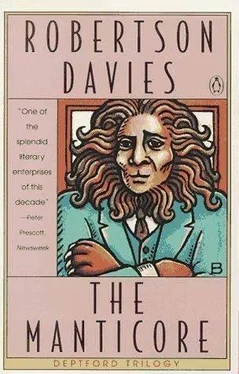"You don't understand," I said; "this is a thing French families do to see that their sons learn about sex in the right way."
"Yes, I have heard that, but I didn't know they put their cast mistresses to the work, the way you put a child rider on your safe old mare."
"That's enough, Knoppy," I said; "you know a lot about the Church and religion, but I don't think that qualifies you to talk about what it is to be a swordsman."
That made him really furious. He became cold and courteous.
"Help me then," he said. "Tell me what a swordsman is and what lies behind the mystique of the swordsman."
I talked as well as I could about living with style, and not sticking to dowdy people's ways. I managed to work in the word amorist because I thought he might not know it. I talked about the Cavaliers as opposed to the Roundheads, and I dragged in Mackenzie King as a sort of two-bit Cromwell, who had to be resisted. Mr. King had made himself unpopular early in the war by urging the Canadian people to "buckle on the whole armour of God", which when it was interpreted meant watering and rationing whisky without reducing the price. I said that if that was the armour of God, I would back the skill and panache of the swordsman against it any day. As I talked he seemed to be less angry, and when I had finished he was almost laughing.
"My poor Davey," he said, "I have always known you were an innocent boy, but I have hoped your innocence was not just the charming side of a crippling stupidity. And now I am going to try to do something that I had never expected to do, and of which I disapprove, but which I think is necessary if between us we are going to save your soul. I am going to disillusion you about your father."
He didn't, of course. Not wholly. He talked a lot about Father as a great man of business, but that cut no ice with me. I don't mean he suggested Father was anything but honest, because there were never any grounds for that. But he talked about the corrupting power of great wealth and the illusion it created in its possessor that he could manipulate people, and the dreadful truth that there were a great many people whom he undoubtedly could manipulate, so that the illusion was never seriously challenged. He talked about the illusion wealth creates that its possessor is of a different clay from that of common men. He talked about the adulation great wealth attracts from people to whom worldly success is the only measure of worth. Wealth bred and fostered illusion and illusion brought corruption. That was his theme.
I was ready for all of this because Father had talked a great deal to me since he began to be more at home. Father said that a man you could manipulate had to be watched because other people could manipulate him as well. Father had also said that the rich man differed from the ordinary man only in that he had a wider choice, and that one of his dangerous choices was a lightly disguised slavery to the source of his wealth. I even told Knoppy something he had never guessed. It was about what Father called the Pathological Compassion of Big Business, which seems to demand that above a certain executive level a man's incompetence or loss of quality had to be kept from him so that he would not be destroyed in the eyes of his family, his friends, and himself. Father estimated that Corporation Compassion cost him a few hundred thousand every year, and this was charity of a kind St. Paul had never foreseen. Like a lot of people who have no money, Knoppy had some half-baked ideas about people who had it, and the foremost of these was that wealth was achieved, and held, only by people who were essentially base. I accused him of lack of charity, which I knew was a very great matter to him. I accused him of a covert, Christian jealousy, that blinded him to Father's real worth because he could not see beyond his wealth. People strong enough to get wealth are sometimes strong enough to resist illusion. Father was such a man.
"You should do well at the Bar, Davey," he said. "You are already an expert at making the worser seem the better cause. To be cynical is not the same as avoiding illusion, for cynicism is just another kind of illusion. All formulas for meeting life – even many philosophies – are illusion. Cynicism is a trashy illusion. But a swordsman – shall I tell you what a swordsman is? It is just what the word implies: a swordsman is an expert at sticking something long and thin, or thick and curved, into other people; and always with intent to wound. You've read a lot lately. You've read some D. H. Lawrence. Do you remember what he says about heartless, cold-blooded fucking? That's what a swordsman is good at, as the word is used nowadays by the kind of people who use it of your father. A swordsman is what the Puritans you despise so romantically would call a whoremaster. Didn't you know that? Of course swordsmen don't use the word that way; they use other terms, like amorist, though that usually means somebody like your Myrrha, who is a great proficient at sex without love. Is that what you want? You've told me a great deal about what you feel for Judy Wolff. Now you have had some skilful instruction in the swordsman-and-amorist game. What is it? Nothing but the cheerful trumpet-and-drum of the act of kind. Simple music for simple souls. Is that what you want with Judy? Because that is what her father fears. He doesn't want his daughter's life to be blighted by a whoremaster's son and, as he very shrewdly suspects, a whoremaster's pupil."
This was hitting hard, and though I tried to answer him I knew I was squirming. Because – believe it or not, but I swear it is the truth – I had never understood that was what people meant when they talked about a swordsman, and it suddenly accounted for some of the queer responses I had met with when I applied the word so proudly to Father. I remembered with a chill that I had even used this word about him to the Wolffs, and I was sure they were up to every nuance of speech in three languages. I had made a fool of myself, and of course the realization made me both weak and angry. I lashed out at Knoppy.
"All very well for you to be so pernickety about people's sexual tastes," I said. "But what cap do you wear? Everybody knows what you are. You're a fairy. You're a fairy who's afraid to do anything about it. So what makes you such an authority about real men and women, who have passions you can't begin to share or understand?"
I had hit home. Or so I thought. He seemed to become smaller in his chair, and all the anger had gone out of him.
"Davey, I want you to listen very carefully," he said. "I suppose I am a homosexual, really. Indeed, I know it. I'm a priest, too. By efforts that have not been trivial I have worked for over twenty years to keep myself always in full realization of both facts and to put what I am and the direction in which my nature leads me at the service of my faith and its founder. People wounded much worse than I have been good fighters in that cause. I have not done too badly. I should be stupid and falsely humble if I said otherwise. I have done it gladly, and I shall only say that it has not been easy. But it was my personal sacrifice of what I was to what I loved.
"Now I want you to remember something because I don't think we shall meet again very soon. It is this; however fashionable despair about the world and about people may be at present, and however powerful despair may become in the future, not everybody, or even most people, think and live fashionably; virtue and honour will not be banished from the world, however many popular moralists and panicky journalists say so. Sacrifice will not cease to be because psychiatrists have popularized the idea that there is often some concealed, self-serving element in it; theologians always knew that. Nor do I think love as a high condition of honour will be lost; it is a pattern in the spirit, and people long to make the pattern a reality in their own lives, whatever means they take to do so. In short, Davey, God is not dead. And I can assure you God is not mocked."
Читать дальше












